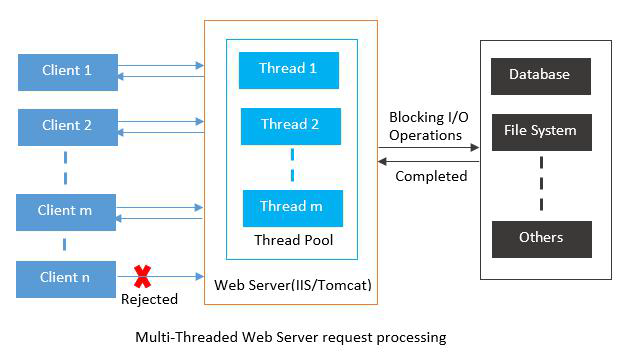Node.js vs. others Server-side Frameworks
Node.js Processing
Node.js differs from other server-side frameworks in that it is built on asynchronous events via JavaScript callback capabilities and uses JavaScript as a programming language. Furthermore, everything in Node.js runs in a single thread.

Server-Side Framework Processing
While existing server-side frameworks such as ASP.NET, JSP, and PHP rely on a multi-threaded web server (IIS/Tomcat). In a multiple-thread system, there is a maximum number of threads that can be used before performance declines.

Problems with Multithreaded Systems
- A multi-threaded web server consumes a lot of RAM when it's busy.
- Threads usually wait for I/O operations to finish.
- With a large number of threads, context switching, and scheduling become significantly faster.
Deployment of Node.js Applications
Node.js applications cannot be deployed on existing hosts such as shared web hosting. You can install and run nodes on VPS or dedicated servers. The simplest method to launch your node application is to use a scalable service like Heroku, which is entirely free and charges only when you need extra capacity.
Key Differences: Node.js vs. Other Server-Side Frameworks
Language
- Node.js is a popular web development framework that makes use of JavaScript.
- Other frameworks use languages such as Python (Django), Ruby (Ruby on Rails), and C# (ASP.NET).
Concurrency Model
- Node.js is a single-threaded, event-driven paradigm with non-blocking input/output.
- Other frameworks frequently use multi-threading or process-based paradigms, which may lead to scalability concerns.
Performance
- Node.js provides excellent performance, particularly in I/O-bound applications.
- Other frameworks There may be performance improvements in CPU-bound workloads or certain usage scenarios.
Ecosystem and libraries
- Node.js Npm provides a rich environment with a wide range of features.
- Other frameworks have ecosystems, but they may not be as deep as npm.
Learning curve
- Node.js Developers that are familiar with JavaScript will find it easier to get started.
- Other frameworks Possess expertise in their respective languages and paradigms.
Use cases
- Node.js Ideal for real-time applications, microservices, and APIs.
- Other frameworks excel in a variety of areas, including quick prototyping, content management, and enterprise applications.
Community and support
- Node.js A large and active community with abundant resources and support.
- Other systems have robust communities, but their size and activity levels may differ.

